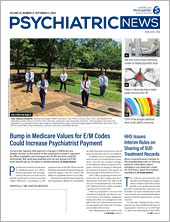Suicide is an “action” that individuals take to escape intolerable suffering. In 2017, it was the 10th leading cause of death in the United States. Given their presence in a wide range of inpatient and outpatient medical settings, consultation-liaison (C-L) psychiatrists have an essential role in treating suicidal patients. With their skill in establishing rapport with distraught patients, C-L psychiatrists can recognize their suffering. They are equipped to help these patients explore the thoughts and feelings that drive them to contemplate suicide.
Several general types of suicidal patients present commonly in the C-L setting:
•
Someone who is receiving care in a medical-surgical unit after a suicide attempt and may or may not still be actively suicidal.
•
Someone experiencing unbearable suffering and flagging hope in the context of a chronic, painful, or terminal condition.
•
Someone at high risk for self-harm due to agitation and impulsivity from psychiatric illness (for example, delirium, psychosis, and substance withdrawal).
Medically ill patients expressing a passive wish to “give up” or an active desire to harm themselves are usually sending a signal of distress rather than indicating an actual wish to be dead. By discerning the psychological issues underpinning the wish or desire, a C-L psychiatrist can foster hope and offer relief through psychotherapeutic and pharmacologic treatment.
C-L psychiatrists can also fill a liaison function for staff deeply affected by caring for several ill patients. Their presence and visibility in medical-surgical settings allows them to offer informal, real-time support to health care professionals and the complex dynamics unleashed in working with complex patients. The following case demonstrates how a C/L psychiatrist might work with a suicidal, medically ill patient.
Case Study
Ms. A, a 40-year-old married computer programmer with relapsing-remitting multiple sclerosis (RRMS), was admitted to a neurology service for management of an RRMS flare. This was her third similar admission in the last three months. The neurology service consulted the C-L psychiatry team for concerns about her fluctuating mood. Hospital staff found Ms. A to be withdrawn and tearful at times, and intensely angry and irritable at others.
Ms. A informed the C-L psychiatrist that she has been dealing with RRMS since she was 19 years old. She reported that her flares typically respond well to high-dose steroids, which were started during this admission. During her past treatment with steroids, she experienced mood fluctuations, anger outbursts, and disrupted sleep, all of which were present during this admission. She had a history of depression that responded to ongoing treatment with venlafaxine. She was reluctant to engage with the C-L psychiatrist initially and requested a sleep medication before ending the psychiatric assessment.
That evening during rounds, a nurse on the unit discovered the patient in her bathroom, fashioning a noose with which to hang herself. This incident prompted an urgent call to the C-L psychiatry team. Ms. A was initially guarded about the aborted suicide attempt, but with persistence and empathy from the psychiatrist, she revealed how demoralized she was by the recent inability to achieve RRMS remission. She reported symptoms of labile mood, hopelessness, and significant sleep disruption. She also reported feeling like a burden to her husband and expressed frustration about her recent lack of productivity at work. She was ashamed and guilty about the suicide attempt; however, she could not dismiss her intrusive thoughts that she would be better off dead.
The C-L psychiatrist determined that Ms. A was experiencing an exacerbation of an underlying depression in the context of high-dose steroids. She recommended continuing the venlafaxine and adding mirtazapine to aid with sleep and augment her depression treatment. She also made herself available for regular supportive psychotherapy during the hospitalization. As the steroid dose was tapered, Ms. A’s mood lability decreased, and her sleep improved. The bedside psychotherapy helped build Ms. A’s immediate coping skills and increase her hope for the future. Her suicidal thoughts rapidly dissipated, and she was discharged with ongoing outpatient psychotherapy and medication management.
Discussion
This case illustrates how C-L psychiatry can assist with managing medically ill patients with acute psychiatric issues. The C-L psychiatrist meticulously explored biological, psychological, and social aspects of Ms. A’s illness. She patiently built trust with the patient, who confided the despair that drove her suicide attempt. She also recognized the prominence of medication side effects in worsening her misery.
The interplay between medical disease, psychiatric illness, and suicide is multifaceted. Demographic risk factors in the general population also apply to people with medical illness. While medical illness is not usually the sole factor driving suicidal behavior, it can be the predominant one, particularly at moments of crisis in medical illness care. Suicide rates are elevated in patients with multiple chronic or end-stage medical conditions, and rates can drop with the introduction of more efficacious treatments (for example, antiviral treatment for HIV and effective cancer chemotherapy). As in the general population, suicide by medically ill people is frequently associated with unrecognized comorbid psychiatric conditions such as depression, substance misuse, delirium, dementia, and maladaptive personality styles.
C-L psychiatrists are most effective when they focus on identifying unappreciated psychiatric comorbidities and psychological meanings that patients apply to their disease rather than the specifics of the medical illness itself. Addressing discouragement and discussing more effective ways of coping may result in rapid improvement in mood and diminution of suicidal thoughts. Above all, the C-L psychiatrist can instill hope in both the patient and her care providers. ■


